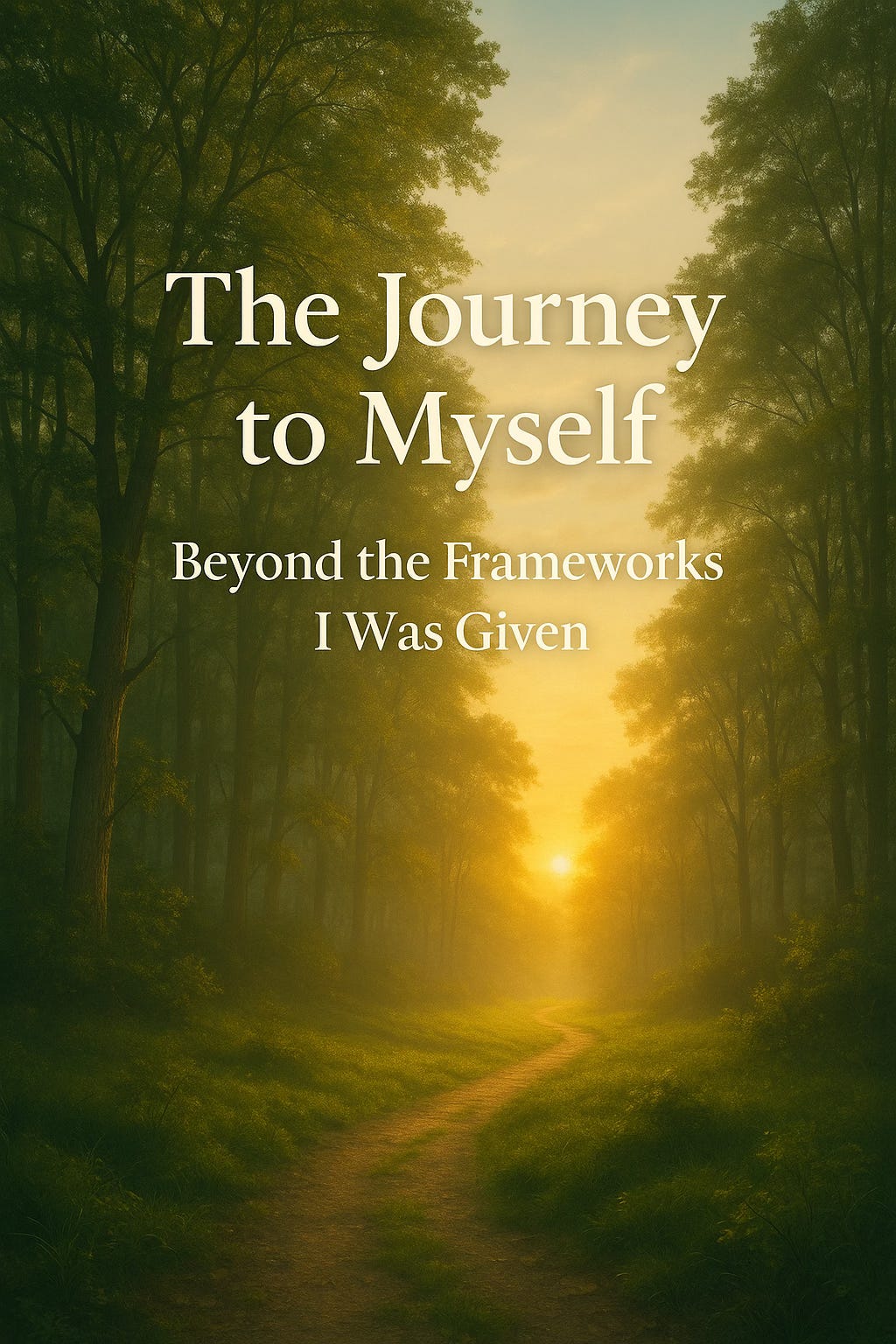Chapter 1 - The Journey to Myself: Beyond the Frameworks I Was Given
From the book, Living as a Cathedral of Awe
Living as a Cathedral of Awe Book
I didn’t know it when I started writing.
At first, I thought I was writing for others.
Maybe to share frameworks.
Maybe to offer healing.
Maybe to build something that would outlive me.
But somewhere along the way, I realized the deeper truth:
I have been writing to find myself.
Each post, each thread, each framework —
has been a breadcrumb on the trail back to the self I lost,
the self I never fully got to be,
the self that has been quietly, patiently waiting for me all along.
I grew up believing I was part of something solid — something sacred.
Catholicism. Faith. Family.
But the version I was given wasn't what it claimed to be.
It was shaped by fear, control, conditional love, and unstated expectations.
In some ways, it wasn’t Catholicism at all.
It was a cult dressed in Catholic clothing.
It told me there were hidden rules I had to figure out.
It punished me for failing to anticipate what could not be known.
It taught me that survival meant pleasing those with power,
even when their demands contradicted themselves.
It was a masterclass in insecurity, instability, and shame.
When I pulled away from the cult, I thought I was free.
When I went to a conservative Catholic college, I thought I had found the real thing.
But even there, I found layers of performance, compromise, contradiction.
I didn’t yet have the tools to name it.
All I knew was that I felt alone and ashamed —
guilty for leaving, guilty for surviving.
It would take years — decades — before I could recognize the pattern for what it was:
A lifetime shaped by narcissism, power games, and betrayal of the very values they preached.
2015 shattered what was left.
Watching so many of the people I had loved and trusted embrace a man who embodied the very opposite of what we claimed to believe —
It ripped through the last illusions I was holding onto.
And I had to ask myself,
"Why am I different?"
"Why does this hurt me when they seem to feel none of the conflict I feel?"
The answer came slowly, painfully, and then all at once:
Because I was never one of them in spirit.
Because I had always been one of the marginalized ones —
Not because of race, but because of my physical disability and neurodivergence,
the parts of me that never quite fit the neat, polished mold of power and performance they prized.
Because I had always been learning, beneath the surface,
to resist narcissistic control, even when I didn’t have the language for it.
In some mysterious way —
the way a child learns how to survive long before they have words —
I found myself drawn to the study of human experience.
To customer experience — a place where it was safe to ask:
What do people truly need?
What makes something feel fair, useful, good?
How do people flourish when their expectations are met — or collapse when they are betrayed?
I could not safely explore these questions in my family, my faith community, or even in many friendships.
But I could explore them there — in work that looked "professional" and "objective" — while quietly, secretly, healing my own heart.
Without knowing it fully, I was building the scaffolding I needed:
A way to create security when none was freely offered.
A way to create clarity where there had only been hidden rules.
A way to create structure that was logical, reliable, and accessible — something I craved but had never been given.
I built it piece by piece.
I made it sturdy enough to stand inside —
no matter what collapsed around me.
The frameworks I created —
the 12 Utilities, PERMAH, the Admiration Equation —
weren’t just about customer experience.
They were about human experience.
They were about my experience.
Each one an unconscious act of self-rescue:
Mapping how to create Clarity where there was none.
Building Security when it was never freely offered.
Seeking Meaning that didn’t require self-betrayal.
Naming the emotional cost of navigating hidden, shifting expectations.
Reclaiming the right to feel Awe, Gratitude, and true Relationship.
Now, for the first time, I am safe enough to write these things directly.
Not all the time.
I still feel the old fear sometimes —
but it comes less often, stays less briefly, holds less power.
Healing, it turns out, is not the absence of fear.
Healing is learning to move forward anyway.
It is creating safety from the inside out.
I am not writing today to convince anyone.
I am not writing to argue with my past.
I am writing to stand with myself — fully, lovingly, without apology.
I am here to honor the fact that in a world that tried to teach me fear,
I chose to learn flourishing instead.
I chose to rebuild, not on the sand of fear,
but on the steady ground of truth, dignity, and self-respect.
If you are reading this and you recognize any part of yourself here,
know this:
You are not alone.
Your healing is not betrayal.
Your awakening is not arrogance.
Your flourishing is not selfish.
It is sacred work.
And you are worthy of it.
Next: Chapter 2 - The Weight of Unspoken Rules: How Hidden Expectations Shaped My World
How hidden, shifting expectations shaped my early experience — and my quest for true clarity and belonging.




